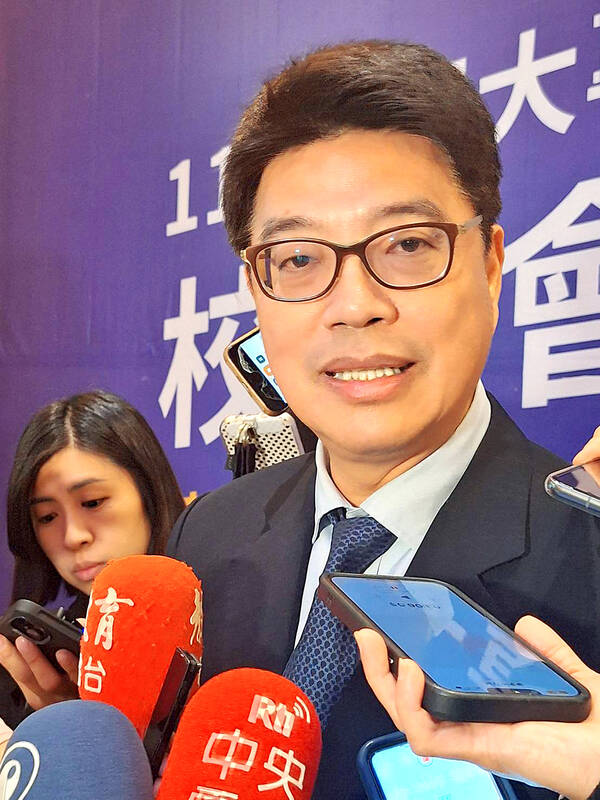Taiwan urges Beijing not to use academic exchanges as “united front” tactics against Taiwan, Mainland Affairs Council (MAC) Minister Chiu Chui-cheng (邱垂正) said yesterday.
Taiwan welcomes Chinese students and included them in the National Health Insurance (NHI) system last year, he said.
Chiu made the remarks after the Ministry of Education on Thursday banned Chinese colleges and universities affiliated with Beijing’s United Front Work Department from conducting academic exchange programs with Taiwanese schools.

Photo: CNA
The blacklist includes Jinan University, Huaqiao University and Beijing Chinese Language and Culture College. The former’s diplomas would no longer be recognized by the ministry, while the latter two never obtained recognition.
Chiu yesterday said that the ministry has given sufficient reasons for the new policy, which the MAC would respect and support.
Taiwanese students could still choose from the remaining 154 Chinese universities to gain a degree recognized in Taiwan, even though Jinan University is disqualified, he said.
Many parents of Chinese students have made telephone calls to the ministry or the MAC asking whether their children could study in Taiwan, Chiu said.
Noting that prior approval from the Chinese government is required, he said that Beijing’s stringent regulation on outbound travel is the main reason that cross-strait academic exchanges are limited, and he called for prompt communications between admission authorities on both sides to improve the situation.
The government embraces Chinese students and has prepared for them by launching more than 10 preferential schemes to aid their academic pursuit in Taiwan, including offering the NHI system, simplifying procedures for Chinese students at customs and expanding recognition of educational credentials to 346 Chinese universities, Chiu said.
Discussion is ongoing about how to provide similar academic exchange programs for Chinese students with permanent residence or dependent residence in Hong Kong, Macau or other countries, he said.
The MAC expects such academic exchange programs to facilitate mutual understanding across the Taiwan Strait, but they should not be used as a means of “united front” tactics, which would not be well received by Taiwanese, Chiu said.
Taiwanese students visiting China on such programs must register their academic exchange activities on the ministry’s system, and remember to help maintain Taiwan’s national interests and international image, he said.
The cross-strait relationship has changed in three ways since the COVID-19 pandemic, Chiu said.
First, Chinese warplanes and warships harassing Taiwan have become normalized, with more than 5,000 aircraft and 2,000 vessels detected around Taiwan last year, he said, adding that more than 3,000 of the 5,000 aircraft crossed the Taiwan Strait’s median line.
Second, Beijing declared its “22 guidelines to penalize Taiwan independence separatists,” with a mailbox set up for reporting those who express support for the Republic of China or do not endorse Beijing’s “one China” principle, he said.
Third, Chinese President Xi Jinping (習近平) has set various goals to achieve his so-called historical missions, which included solving the “Taiwan problem,” he said.
The MAC would continue to collaborate with the ministry to build the public’s “China literacy,” including providing relevant teaching resources, Chiu said.

AIR SUPPORT: The Ministry of National Defense thanked the US for the delivery, adding that it was an indicator of the White House’s commitment to the Taiwan Relations Act Deputy Minister of National Defense Po Horng-huei (柏鴻輝) and Representative to the US Alexander Yui on Friday attended a delivery ceremony for the first of Taiwan’s long-awaited 66 F-16C/D Block 70 jets at a Lockheed Martin Corp factory in Greenville, South Carolina. “We are so proud to be the global home of the F-16 and to support Taiwan’s air defense capabilities,” US Representative William Timmons wrote on X, alongside a photograph of Taiwanese and US officials at the event. The F-16C/D Block 70 jets Taiwan ordered have the same capabilities as aircraft that had been upgraded to F-16Vs. The batch of Lockheed Martin

GRIDLOCK: The National Fire Agency’s Special Search and Rescue team is on standby to travel to the countries to help out with the rescue effort A powerful earthquake rocked Myanmar and neighboring Thailand yesterday, killing at least three people in Bangkok and burying dozens when a high-rise building under construction collapsed. Footage shared on social media from Myanmar’s second-largest city showed widespread destruction, raising fears that many were trapped under the rubble or killed. The magnitude 7.7 earthquake, with an epicenter near Mandalay in Myanmar, struck at midday and was followed by a strong magnitude 6.4 aftershock. The extent of death, injury and destruction — especially in Myanmar, which is embroiled in a civil war and where information is tightly controlled at the best of times —

Taiwan was ranked the fourth-safest country in the world with a score of 82.9, trailing only Andorra, the United Arab Emirates and Qatar in Numbeo’s Safety Index by Country report. Taiwan’s score improved by 0.1 points compared with last year’s mid-year report, which had Taiwan fourth with a score of 82.8. However, both scores were lower than in last year’s first review, when Taiwan scored 83.3, and are a long way from when Taiwan was named the second-safest country in the world in 2021, scoring 84.8. Taiwan ranked higher than Singapore in ninth with a score of 77.4 and Japan in 10th with

SECURITY RISK: If there is a conflict between China and Taiwan, ‘there would likely be significant consequences to global economic and security interests,’ it said China remains the top military and cyber threat to the US and continues to make progress on capabilities to seize Taiwan, a report by US intelligence agencies said on Tuesday. The report provides an overview of the “collective insights” of top US intelligence agencies about the security threats to the US posed by foreign nations and criminal organizations. In its Annual Threat Assessment, the agencies divided threats facing the US into two broad categories, “nonstate transnational criminals and terrorists” and “major state actors,” with China, Russia, Iran and North Korea named. Of those countries, “China presents the most comprehensive and robust military threat